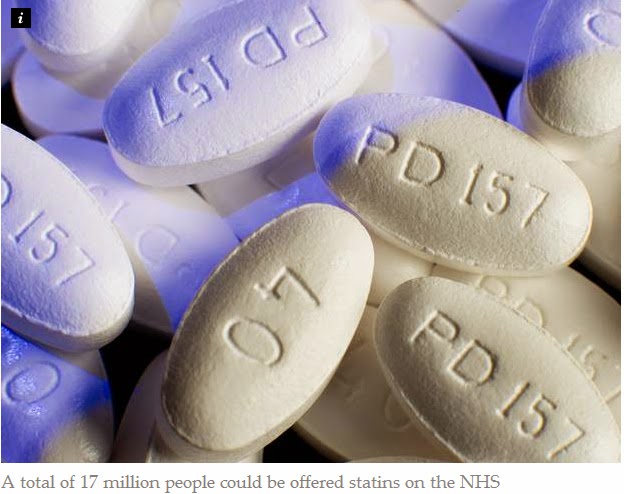Friday, 18 July 2014
Prescribing Statins More Widely Could Avert Tragedy’, New Medical Guidelines Suggest
Four-and-a-half million more adults should be offered statins to avert “a tragedy waiting to happen” by reducing the number of people suffering heart attacks and strokes, according to new medical guidelines.
Rejecting claims that offering cholesterol-reducing drugs to currently healthy people risked an overmedicalisation of society, the National Institute of Health and Care Excellence (Nice) said the move was necessary to save thousands of lives a year.
A total of 17 million people could be offered statins on the NHS, after experts said people with a 10 per cent risk of developing cardiovascular disease within 10 years should receive the drugs, lowering the threshold from 20 per cent.
A previous draft of the guidance, issued earlier this year, had been heavily criticised for recommending statins be given to patients bearing such a low risk – with leading doctors, including the president of the Royal College of Physicians, arguing that it would be unnecessary and expensive.
Currently 12.5 million people are eligible for the drugs, and prescribing statins to an extra 4.5 million people would mean an additional cost of £52m a year to the NHS.
But the Nice guidance panel said yesterday its decision was based on the “biggest ever clinical trial” – saying it could potentially save as many as 50,000 lives a year.
However, they concede that because the uptake of statins is normally around 60 per cent, a figure of 4,000 lives saved and 22,000 stokes and heart attacks prevented over three years is more realistic.
Statins are already the most prescribed drugs on the NHS, but cardiovascular diseases remains the cause of one in three of all deaths in the UK.
Some doctors have claimed that evidence for the new guidelines is based almost entirely on studies funded by the pharmaceutical industry. The controversy was exacerbated by an article in the British Medical Journal saying 20 per cent of the patients using statins suffered side effects, including fatigue, psychiatric symptoms, erectile dysfunction and an increased risk of developing diabetes – but that report was later withdrawn.
Professor Mark Baker, director of the Centre for Clinical Practice at Nice, said the claims were “ludicrous”.
“Nobody gets onto our guideline groups if they have any significant vested interest, especially a financial interest,” he said. “Statins are safe and effective and it is a good deal for more people to have access to them under the NHS. ”
Responding to attacks on the “integrity” of his panel, Professor Baker said there is a “risk noise distorts the message, to the point where people whose lives are going to be saved by statins come off them”. He added: “From a public health point of view it is a tragedy waiting to happen.”
Culled from The Independent UK
Subscribe to:
Post Comments (Atom)

No comments:
Post a Comment